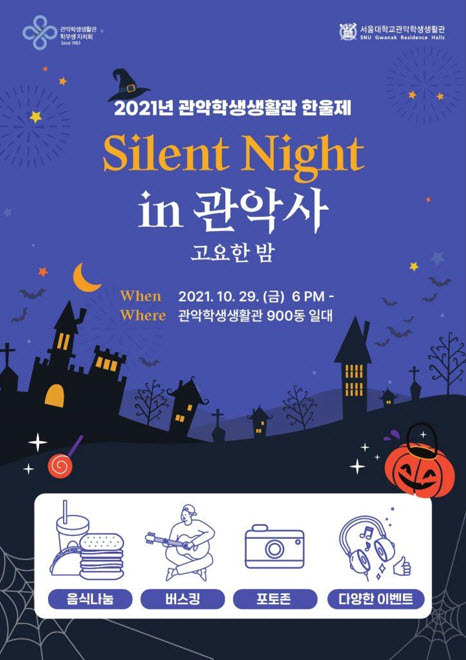
Gwanak Residence Hall’s “Silent Night” Festival
On October 29th, 6pm, the SNU dormitories flooded with music and festivities as the “Silent Night” festival was officially launched. “Silent Night” was the theme of this year’s Han-Ul festival, which is annually hosted by the SNU Gwanak Residence Halls (GRH) to provide opportunities for its residents to interact with each other and take a break from academics. The event was titled “Silent Night” to emphasize that although this was a festival, the purpose of it was peaceful relaxation rather than a loud party. Although the 2020 Han-Ul festival was conducted online due to COVID-19, the celebration made a comeback offline this year, with proper social distancing measures implemented during the entirety of the event.
The Silent Night festival consisted of a variety of activities that provided both entertainment and an educational experience for students. On the entertainment side, there were booths operated by the GRH clubs that ran mini-games such as darts, and the dormitory RA offices ran competitive card games. Educationally, the Silent Night celebration hosted a booth for the CR environment club, which ran a refill station and sold reusable household items such as zero-plastic soap. The club was invited in light of the rising concerns about the increased usage of single-use plastics in the dormitories after the outbreak of COVID-19. All booths were required to strictly follow social distancing measures such as keeping record of each visitor, conducting temperature checks, and limiting the number of people at each stall. Other activities in the festival included busking, a photo booth, as well as a flea market where students could sell second-hand or handmade items.

Continuing with previous Han-Ul festival traditions, the Silent Night celebration also ran a free food-sharing stall, although eating locations were strictly monitored. “We paid careful attention to the food stall and deliberated in-depth about how we could still run it safely,” said Jiyeong Kim, the resident director in charge of the festival. “In previous years, food was shared with everyone on a tray and students were free to eat inside or outside. However, this was not an option this year and we had to make sure that social distancing measures were strictly enforced when getting the food and eating it.” Ultimately, the food stalls were operated successfully and safely through strictly monitoring the distance between the people waiting in the queue, and prohibiting consumption outside the designated area inside the school cafeteria. Burgers and kebabs were chosen as the menu for the food stalls because students could easily bring them to the assigned area, and because students could enjoy different types of meat, depending on their food restrictions.

Students participated in different activities hosted by various stalls
The offline Han-Ul Festival
The Silent Night Han-Ul festival is one of the few offline events that have started to reemerge after a break due to the pandemic. When asked about the purpose of launching the festival offline, Dohyun Kim, the chief resident director, commented that he could see and feel the students’ exhaustion as their university life became severely restricted due to the pandemic. “We wanted to deliver the message to students that they are not isolated and encourage them to continue forward. The best way to do this seemed like offline festivities.”
Certainly, in the past two years, many SNU events were conducted online. However, the Silent Night festival shows that with proper precautionary measures and strict adherence to them during events, offline festivals can be run successfully. These measures can include, 100% mask policies, vaccination requirements, and limitations on the number of visitors.
The Silent Night festival was an immense triumph that provided relief and excitement to the students that attended. “I came to university looking forward to school festivals and I was glad that I could finally experience one. The activities and atmosphere were uplifting and I hope more such events are held in the future.” said Min Kyu Kim (College of Humanities).
Written by Yeryoung Lee, SNU English Editor, yeryounglee@snu.ac.kr
Reviewed by Professor Travis Smith, Department of Asian Languages and Civilizations, tlsmith@snu.ac.kr

